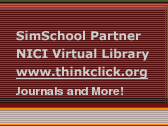|
You are in:
Educational Type —>
Secondary source
Secondary sources are written in response to a primary source. Secondary sources are usually criticism, reviews, or are based on another book or journal.
-
Alberta Assessment Consortium's Framework for Student Assessment (Excerpts)
Assessment, evaluation, and communication of student achievement and growth are integral parts of schooling. Each part of the process should be a positive experience for students and promote growth.
-
Arranging the Physical Environment of the Classroom to Support Teaching/Learning
Part of a series on highly effective practices.
-
Assessment in Music (Texas Framework)
The pages in this web site discuss internal assessment, developed within the school, and external assessment, developed outside the school but often required, and how they can be combined to help students and teachers better assess music learning.
-
Assessment of problem based learning
Because instruction and learning is different in problem based settings than traditional instruction, problem based learning provides a quandry for many instructors at student evaluation. This web page examines two separate factors: assessing students to determine their grade in a problem based learning curriculum; and depicting results from studies that have focused on assessing the value of problem based learning curricula.
-
Constructing School Partnerships with Families and Community Groups
Educators sometimes are content to let parents and families take the initiative in becoming involved in their children's education. But for a real partnership to occur, educators must look at ways in which the school can initiate this involvement.
-
Education and Simulation/Gaming and Computers
"Many teachers balk at the very thought of taking up valuable class time playing a "game." But, is using a computer game, or any game, as a learning tool so implausible?"
Author Jerry Seay, Faculty Member College of Charleston has put together an answer and some resources on games and simulations.
-
Introduction to Mentoring Practices
This publication has been prepared by the Training and Development Directorate of the NSW Department of Education and Training to further promote discussion on mentoring and foster professional learning in the first years of teaching. It brings together some of the national and international literature in the area pointing out new areas for research.
-
Issues in mentoring and induction practice emerging from the literature and case studies
This online article addresses questions such as:
What are the characteristics of effective mentoring relationships? Should mentors be identified by mentorees? Should the roles of mentor and appraiser be assigned to different people? Mentoring practice: Are there advantages for mentors?.
-
Parent-School-Community Partnerships in Secondary Schools
This article on the national PTA web site is geared to parents and has an informal summary of well-being and resilience research.
-
Playing to Learn: Games, simulations and virtual environments in online learning.
This powerpoint was the Sloan-C Plenary by David Gibson in November 2006.
-
Practical Ideas on Alternative Assessment for ESL Students. ERIC Digest.
"Many educators have come to recognize that alternative assessments are an important means of gaining a dynamic picture of students' academic and linguistic development. "Alternative assessment refers to procedures and techniques which can be used within the context of instruction and can be easily incorporated into the daily activities of the school or classroom" (Hamayan, 1995, p.
-
Scalable Persuasion - SITE 2006 PT3 Panel Presentation
David Gibson presented this powerpoint as part of a panel on "dissemination strategies and tactics" at the SITE 2006 conference in Orlando, FL.
-
simSchool: An instructional technology for teacher education - Christensen, Gibson, Knezek
Stemming out of a “Preparing Tomorrow’s Teachers to Use Technology” PT3 project, simSchool is an online simulation of a classroom that offers a virtual practicum for preservice and early year teachers. It was released for public use on March 1, 2006 and has been piloted in 8 higher education institutions with over 200 preservice students.
-
Study Groups
ASCD site sharing what are, why use and how to start study groups.
-
Teacher Research
This introduction by Sharon Parsons of San Jose State University begins.. "Traditional educational research has limited usefulness for classroom teachers.
-
Teacher research leads to learning, action
This article by Joan Richardson, which appeared in the National Staff Development Council's "Tools for Schools", February/March 2000 presents the definition of action research as "a process where participants–who might be teachers, principals, support staff–examine their own practice, systematically and carefully, using the techniques of research,’’ according to Cathy Caro-Bruce who leads the extensive action research efforts in the Madison (Wis.) Metropolitan School District. Caro-Bruce is author of a forthcoming NSDC book, The Action Research Facilitator’s Handbook.
-
Video Games in Education
Computer and video games are a maturing medium and industry and have caught the attention of scholars across a variety of disciplines. By and large, computer and video games have been ignored by educators.
-
What is Action Research?
The concept of teacher-as-researcher is included in recent literature on educational reform, which encourages teachers to be collaborators in revising curriculum, improving their work environment, professionalizing teaching, and developing policy. Teacher research has its roots in action research.
|



 ---
---

 Funded by the
Funded by the